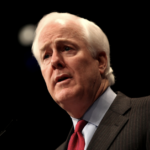Texas Senator Ted Cruz (R) has recently launched an investigation into the restrictions and censorship of social media companies. As the Ranking Member of the Senate Committee on Commerce, Science and Transportation, Sen. Cruz is challenging the companies’ practices to see if they contain bias.
“As you are well aware, social media companies rely on algorithms to not only moderate content, but also to surface personalized recommendations to users,” said Cruz. The senator’s statement is specifically addressed to Meta, Google, Twitter and TikTok. Twitter and Meta, the parent company of Facebook, have come under recent controversy for their censorship of the former president of the United States, Donald Trump (R). However, all of the previously mentioned companies, in some way, have been practitioners of censorship.
Cruz questioned the algorithms of social media companies, saying, “Recommendation systems play an increasingly ubiquitous role in selecting content for individual consumption, including by promoting some content, using product design elements to prominently display recommendations, and downranking or filtering disfavored content and accounts.”
Social media usage can be dangerous as it can take up a large amount of the users' time, possibly becoming addictive. The congressman questions these aspects, saying, “At their best, recommendations help users discover interesting or relevant content that they might not otherwise find on a platform. However, recommendation systems can also fuel platform addiction by feeding users an essentially infinite stream of content.” “This can be especially dangerous when recommendations make it easier for vulnerable users, especially teenagers, to find objectively harmful content, such as content that promotes eating disorders and self-harm,” stated Cruz, lamenting the effect the rules could have on adolescents.
Cruz concluded his statement with a broader claim decrying the filtering of social media, which he states is a major source of news. “In addition to my concerns about the addictive nature of these systems, I am equally concerned with how censorship within recommendations impacts the distribution of speech online. In a world where seven out of ten Americans receive their political news from social media, the manner in which content is filtered through recommendation systems has an undeniable effect on what Americans see, think, and ultimately believe,” stated the senator.
The social media companies’ punishments can vary from “shadow-banning” to removing users from platforms for a period of time. The senator’s investigation, if successful, could change the way companies monitor the content on their platforms.








